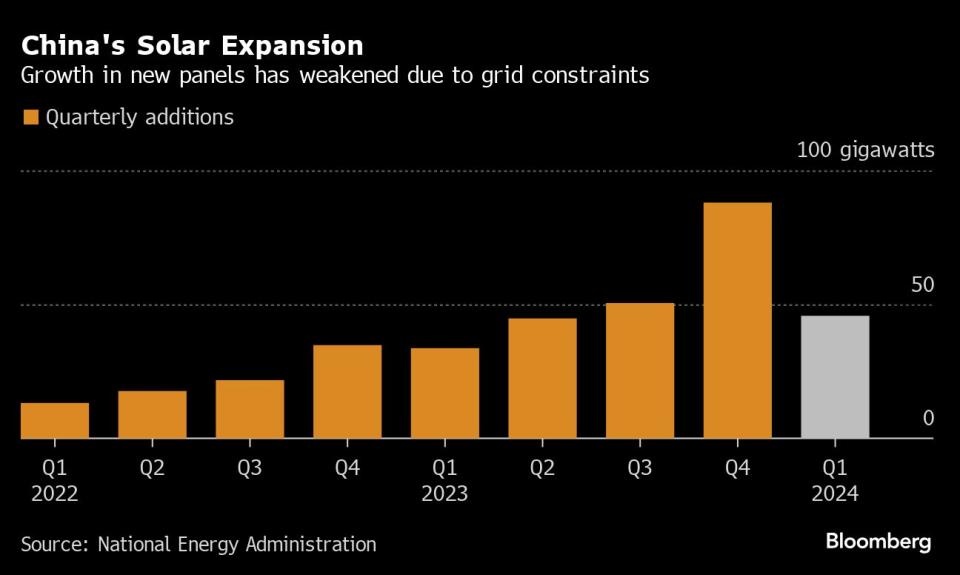China Accelerates Grid Projects to Keep Up With Renewables Boom
(Bloomberg) -- China is ramping up investments in grid infrastructure to keep pace with a record-setting boom in renewables that has put the electricity network under unprecedented strain.
Most Read from Bloomberg
Billionaire-Friendly Modi Humbled by Indians Who Make $4 a Day
A Struggling Business Park Deals a Blow to Singapore's Regional Hub Ambitions
‘Everything Is Not Going to Be OK’ in Private Equity, Apollo’s Co-President Says
BlackRock, Citadel Back Texas Stock Exchange in Challenge to NYSE
The National Energy Administration said this week it will accelerate transmission projects, with the goal of completing 37 major power lines and starting construction on another 33 by the end of the year. It follows a State Council directive to increase the national target for battery storage capacity by 2025.
The renewed emphasis on cables and batteries comes as an abundance of intermittent wind and especially solar generation overwhelms some regional grids, leaving them with too much power in the middle of the day. Solar farms are more frequently being forced to unplug to avoid overloading the system, and the average panel was online 10% less in the first four months compared to the same period last year, according to government data.
The result is that China is still installing more solar panels than anyone else, but the breakneck pace of that growth has been checked.
There are two solutions. The first is to dial back installations until the grid can catch up, which is what China did the last time the problem arose in the late 2010s. That’s an unlikely choice now, though, because clean energy manufacturing is becoming an important driver of economic growth. President Xi Jinping has kept up the pressure on the power sector to add renewables capacity, and last week the government tweaked its rules to allow installations to continue even when wasted power rises.
The second option is to transform the network, by transferring excess clean power to where it’s needed via more electricity lines, or by holding more of the energy in storage systems. Grid operators are meeting the challenge, increasing spending by 25% over the first four months of the year to 123 billion yuan ($17 billion).
The State Council — China’s cabinet — has raised its target for battery storage capacity to 40 gigawatts by 2025, from a previous goal of 30 gigawatts. With about 35 gigawatts already installed at the end of 2023, the country’s likely to quickly shoot past that target. Jefferies Financial Group reckons capacity will probably double this year.
Still, building the infrastructure is only half the battle. China needs to fix its power market, as well. Most battery storage currently goes unused because prices in many places are largely the same whatever the time of day, creating little incentive to charge or discharge power.
Xi has hinted that the sector could be a topic for policymakers at the third plenum, a closed-door Communist Party conclave in July that will be closely watched for signals on the government’s priorities. Citigroup Inc. analysts including Pierre Lau expect power reforms to be unveiled at the meeting, triggering more grid investments and a greater focus on relying on the market to set prices.
On the Wire
Chinese clean technology isn’t “artificially cheap,” as Joe Biden said in trying to justify higher tariffs, David Fickling writes. It’s just cheap — and the world needs it to meet the energy transition challenge.
China’s green policy target is at risk, three indicators suggest.
China-Russia relations are more unbalanced than they may seem.
Chinese solar firms are halting production at Southeast Asian factories as increased US trade barriers create uncertainty for exports from the region.
China, the world’s largest wheat producer, said it will boost state purchases of the grain in a move to bolster prices and protect farmers’ interests amid weak demand.
This Week’s Diary
(All times Beijing unless noted.)
Thursday, June 6:
Chongqing Petroleum and Gas Exchange forum, day 2
Friday, June 7:
China’s 1st batch of May trade data, including steel, iron ore & copper imports; steel, aluminum & rare earth exports; oil, gas & coal imports; oil products imports & exports; soybean, edible oil, rubber and meat & offal imports ~11:00
China foreign reserves for May, including gold
China weekly iron ore port stockpiles
Shanghai exchange weekly commodities inventory, ~15:30
Chongqing Petroleum and Gas Exchange forum, day 3
--With assistance from Kathy Chen.
Most Read from Bloomberg Businessweek
David Sacks Tried the 2024 Alternatives. Now He’s All-In on Trump
Sam Altman Was Bending the World to His Will Long Before OpenAI
Startup Brings New Hope to the Pursuit of Reviving Frozen Bodies
The Budget Geeks Who Helped Solve an American Economic Puzzle
©2024 Bloomberg L.P.

 Yahoo Finance
Yahoo Finance 

